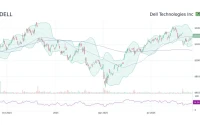It took less than a year.
For nearly a decade, the center of gravity for sophisticated Bitcoin trading existed in a world apart from Wall Street. The premier venue was Deribit, a Dubai-based exchange that became the go-to platform for the professional traders and hedge funds who wanted to dance with Bitcoin's notorious volatility using options contracts. It was the crypto-native choice, built by and for the ecosystem it served.
Now, that center of gravity has been ripped away and replanted squarely in New York. The new king is BlackRock’s iShares Bitcoin Trust (IBIT), a regulated, US-based Bitcoin ETF launched only in 2024. According to the latest data from Bloomberg Intelligence, IBIT now commands the largest share of Bitcoin options by notional open interest, a staggering $38 billion.
This isn't just a headline. It's a seismic event marking the end of one era and the aggressive beginning of another, and it shows Why BlackRock's Bitcoin ETF proves 'ETFs are no joke'. The financial plumbing of the world’s largest digital asset is being rerouted, and the implications are only just beginning to surface.
The Anatomy of a Liquidity Heist
To understand the magnitude of this shift, one has to appreciate what an options market truly represents. It’s not just about the spot `price of bitcoin`; it's the marketplace for its future volatility. Open interest (the total number of outstanding contracts that have not been settled) is the purest measure of liquidity and market conviction. For years, Deribit was the undisputed champion, the place where the real money made its most complex bets.
Then came the `bitcoin etf` approvals. BlackRock’s IBIT, with its total net assets now hovering around $91 billion—to be more exact, $90.87 billion—didn’t just enter the race; it fundamentally changed the track. The speed of its ascent in the options market is the critical data point. We’re not witnessing a gradual market share erosion. This is a hostile takeover executed with the brutal efficiency of institutional capital.
Think of it like this: for years, the most skilled poker players gathered in a legendary, slightly dusty, backroom game. They knew the rules, the tells, the flow. Suddenly, a casino, owned by the biggest corporation in the world, opens next door. It’s brightly lit, federally regulated, and offers the exact same game but with deeper tables and an army of new players drawn in by its legitimacy. The old backroom isn't just empty; it's irrelevant. That’s what BlackRock has done to the crypto-native options space.

This migration of capital from offshore, lightly regulated venues to the US market is the most significant piece of `bitcoin news` this year. It validates the entire premise of the ETFs: that a massive, untapped pool of institutional and retail money was waiting on the sidelines, held back not by a lack of interest in Bitcoin, but by a lack of regulated, familiar, and highly liquid products. I’ve looked at hundreds of market structure shifts, and this is the part of the data that I find genuinely puzzling: not that it happened, but the sheer velocity of it. What does it say about the underlying crypto market structure that its core liquidity could be captured so completely, so quickly? Was the "decentralized" foundation always that fragile?
The Inevitable Pull of a Financial Black Hole
Bloomberg analyst Eric Balchunas put it succinctly on X, noting that options markets tend to be more "winner-take-all" than the market for ETF assets under management (AUM). This is not an opinion; it's a structural reality of financial markets. Liquidity is a self-reinforcing force. Traders go where the other traders are, which attracts more traders, creating a feedback loop that is nearly impossible to break once it reaches critical mass. IBIT isn't just leading; it's becoming a liquidity black hole.
We can see this in the numbers. IBIT’s open interest dwarfs that of its competitors, including Grayscale’s converted trust and Fidelity’s offering. While those are successful products in their own right, they are not even in the same league when it comes to the options market. BlackRock has won the liquidity war, and in derivatives, that’s the only war that matters.
Balchunas’s other comment—"Fat crypto margins are in trouble"—is the logical conclusion. The business model of many crypto-native exchanges was built on a combination of high fees, regulatory arbitrage, and a captive audience. The ETFs, particularly one with the scale and efficiency of BlackRock, dismantle that model piece by piece. They operate on razor-thin margins and leverage existing institutional infrastructure to lower costs. The "crypto premium" is evaporating.
This raises a crucial question that the data doesn't yet answer. If the most profitable and sophisticated trading activities are now being consolidated onto a single, regulated US product, what happens to the rest of the global crypto ecosystem? Does it wither, forced to compete for a shrinking pool of niche users, or does it find new ways to innovate? And can any "decentralized" alternative truly compete with the gravitational pull of a product backed by a firm that manages trillions (with a T) of dollars? The early evidence suggests a difficult road ahead.
This Was Never a Fair Fight
Let's be clear about what we've just witnessed. This wasn't a plucky startup disrupting an incumbent. This was the financial establishment, led by its most powerful player, observing a nascent and inefficient market, and then systematically conquering it. The success of the IBIT `bitcoin etf`, particularly in the derivatives space, is a testament to the raw, unassailable power of institutional scale, distribution networks, and regulatory legitimacy.
The crypto-purist dream of a parallel financial system, free from the control of Wall Street, has run headfirst into a brutal reality. Wall Street didn't destroy Bitcoin; it simply absorbed its most profitable functions into its own ecosystem, packaging it in a way that its own clients could understand and trust. The story of IBIT's dominance isn't about crypto winning. It's about BlackRock winning. And the numbers don't lie.









